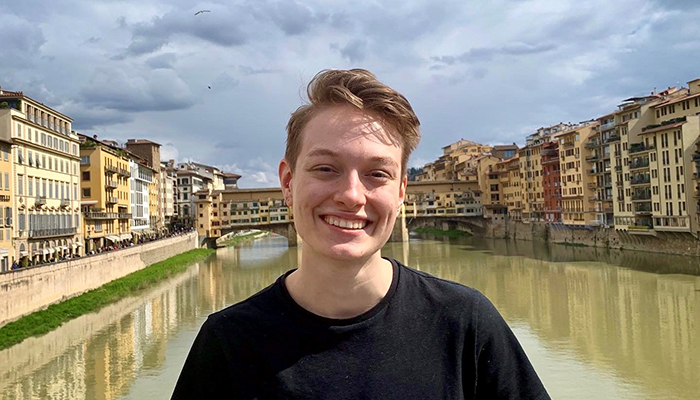In This Story

The semester-long study-abroad program in Spain was a significant challenge—the classes were delivered entirely in Spanish—but multiple rejections for important internships were equally daunting for George Mason University’s Logan Lehman.
“I was rejected from all the internships I applied for after my sophomore year,” they said.
But Lehman, who graduated this May with a degree from the Schar School of Policy and Government’s Government and International Politics and another in Spanish, discovered how to remove roadblocks to their success: “Take classes that have subject matter relevance for the internships you want,” they said. “Secondly, build up relationships with professors by asking questions and going to office hours” for face-to-face meetings. Those relationships often lead to opportunities that contribute to successful internship applications.
That’s important advice for any college student who is stymied by rejection. In Lehman’s case, the Blacksburg, Virginia, native ultimately landed an internship position with the Guatemala Human Rights Commission/USA. That experience, in addition to serving as a peer mentor at Mason’s Honors College and working as research assistant at the National Institute on Drug Abuse, led to their current status as a project coordinator at the University of Pittsburgh School of Public Health’s Willingness 2 Participate project, which engages those who have been in the criminal justice system by training them how to conduct research.
During their Schar School career, Lehman was guided through Undergraduate Research Assistant Programs (URAP) by Assistant Professor Christopher Berk. URAP offers undergraduate students the opportunity to gain hands-on experience with social science research. Students receive direction and mentorship from Schar School faculty members who seek to work with undergraduate research assistants. The program matches faculty research projects with undergraduate students who have interests or skills consistent with specific faculty research projects.
Lehman made a point to get to know their professors, and vice versa. Over their years they worked with Schar School associate professor Delton Daigle, as well as Schar School assistant professors Christopher Berk and Lucas Núñez, who served as advisors on their capstone thesis.
“It was a pleasure to work with Logan,” Núñez said. “Logan is really hardworking and has always been willing to explore new tools and ideas to try make the best possible project to contribute to knowledge and the scholarly community.”
That drive to succeed comes from enjoying what they are doing, Lehman said: “It’s important to have something interesting, meaningful, and helpful to other people.”
As for that semester in Spain, despite the frequent language barrier, Lehman recommends other students accept similar seemingly daunting adventures.
“I got to learn a lot about Spanish history, culture, and politics—and boost my language skills,” they said.
Additional reporting by Buzz McClain.
